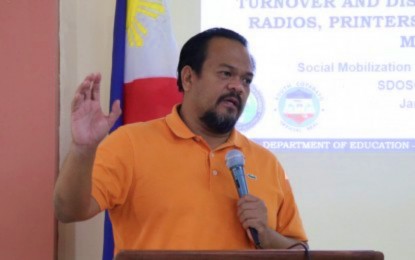
South Cotabato Governor Reynaldo Tamayo Jr. (File photo courtesy of South Cotabato PIO)
KORONADAL CITY – South Cotabato’s hog industry is facing serious threats after the area has been declared by the Department of Agriculture–Soccsksargen (DA-12) under “red zone” for the African swine fever (ASF).
South Cotabato Gov. Reynaldo Tamayo Jr. said Monday DA-12 and the Bureau of Quarantine have upgraded the province’s zoning status to red following the emergence of confirmed ASF cases in the last three months in at least two municipalities.
More than 400 backyard hogs have been culled since March in parts of Banga and Surallah towns due to the ASF contamination.
“The hog industry is one of our economic drivers, and I’m worried because this problem, if not corrected, would greatly affect our economy in the coming months,” the governor said at the provincial capitol’s weekly convocation program.
Tamayo said the local government, through the Provincial Veterinary Office (PVET), and the DA have tried to contain the initial contamination. However, it continued to spread due to the uncontrolled movement of hogs from the infected areas.
He said some backyard farmers and growers did not heed the mandatory culling, and eventually slaughtered and sold possibly contaminated meat to other areas, causing the disease to further spread.
The first ASF contamination was reported in late March in Purok Riverside, Barangay Yangco in Banga town, affecting seven other barangays and resulting in the culling of over 200 hogs.
On April 28, the PVET said in a report, the outbreak has been contained, and it started to implement a 90-clearing program in the affected areas.
Outbreaks
On June 10, however, the Surallah town government reported fresh outbreaks of suspected ASF in sitios Aliwanay and Cabuling in Barangay Naci, with 187 hogs so far culled.
To contain the spread of the disease, Surallah Mayor Antonio Bendita issued Executive Order No. 17, which regulated the slaughter and banned the movement of hogs within the municipality until June 30.
With the province now under the ASF red status, Tamayo said he ordered the PVET and the concerned municipalities to intensify their border security and strictly implement the ban on the movement of hogs and meat products.
He also directed the release of additional funds from the Provincial Disaster Risk Reduction and Management Office to ensure that all hogs affected by the mandatory culling would be properly compensated.
Affected farmers and growers received compensation ranging from PHP2,000 to PHP5,000 for each culled swine.
Tamayo said a group of commercial hog growers also provided relief financial incentives for the affected hog raisers.
Backyard growers and commercial farm owners should immediately report any case of contamination in their areas or facilities to prevent the further spread of ASF, the governor said.
“Residents should also be cautious when buying meat products and avoid those from the infected areas,” he said.
Wipe out
He warned that the situation, if not resolved, could trigger the displacement of workers and affect thousands of families that are mainly dependent on the industry.
A major outbreak could potentially wipe out commercial farms with 1,000 to 4,000 heads in inventory, with at least 300 workers from each farm possibly losing their jobs, he said.
South Cotabato, including General Santos City, is considered among the top producers of live hogs and pork in the country, and previously shipped out at least 15,000 heads every two weeks to Metro Manila and Luzon.
The South Cotabato Swine Producers Association, the biggest association of commercial swine farms in the area, has a combined sow population of 55,000 and produces at least 45,000 heads of hogs a month.
“Rest assured that we are implementing the necessary measures to contain this and bring back our situation to the normal status,” the governor said. (PNA)
